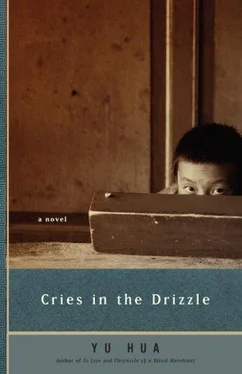I was taken aback by the sight of the woman upstairs, because I had seen her before. Her features, though cruelly altered by the passage of years, were unmistakably those of Feng Yuqing. The shy young girl was now a mother, self-assured and unconstrained.
Lulu, who just a minute ago had been fleeing his mother's onslaught, to my surprise came over to retrieve the shoe and then went upstairs again to return it. He clutched it tightly against his chest, the same way he would hold his satchel, and walked toward his punishment, his little body swaying. Feng Yuqing could be heard yelling, “Get out of my sight!”
He came downstairs with head bowed, looking hard done by. I went over and ruffled his hair, but he brushed aside my gesture of sympathy. With tears in his eyes he stomped off toward a clump of bamboo.
Our friendship quickly blossomed. Two years earlier, I had experienced the warmth of friendship thanks to Su Yu, my senior in years, and now when I was with little Lulu I often felt as though I were Su Yu, gazing at me as I once was.
I enjoyed my talks with Lulu, and even if he didn't fully understand a lot of what I said, the way he looked at me so attentively, his dark eyes gleaming with admiration, made me feel that I enjoyed the complete, unconditional trust of another human being. After I had finished saying something and shot him a smile, Lulu would open a mouth yet to accumulate a full set of teeth and beam at me with equal pleasure, no matter whether he had really taken in what I told him.
Only later did I realize that Lulu in fact had no siblings, but I kept quiet about that so that he would not feel I had noticed his invention. In forlorn, friendless moments, he turned to a fictitious brother for support. I understood how much he needed imagination and hope, for they were equally vital to me.
Just as I had been jealous of Zheng Liang on Su Yu's account, Lulu was jealous of him on mine. In fact, that time when Zheng Liang greeted me in the street he did not look so delighted to see me as to give Lulu much cause for complaint. Never having been more than a casual acquaintance, he simply came over to say a few words of greeting, and now that he had so many new pals his own age he made no effort to conceal his astonishment that I was with such a small boy as Lulu. While we chatted, Lulu was left out in the cold, and he soon announced in a loud voice, “I've got to go.”
He went off by himself, obviously nettled. I brought my conversation with Zheng Liang to an abrupt close and caught up with him. But his displeasure continued for at least another twenty yards, for he turned a deaf ear to what I was saying and then delivered a warning in his crisp little voice, “I don't like you talking with him.”
Lulu's exclusive and high-handed attitude to friendship threw me off balance any time we ran into Zheng Liang after that, and often I would pretend not to have seen him and hurry off. I did not find this confining, for I knew very well that Zheng Liang and I had no claims on each other; his friends were young factory workers who wore fashionable clothes and had cigarettes dangling from their mouths, talking loudly as they walked down the street. Lulu was my only companion.
Practically every day, when classes finished I would stand outside Lulu's primary school and wait for him to emerge. Despite his tender age, he was perfectly able to keep his feelings in check, and he never seemed overly excited to see me but would greet me with a composed smile. Only on one occasion — when I did not stand in my usual place — did Lulu betray some emotion: a look of anxiety appeared on his face as he came out the gate and failed to see me right away. He stood rooted to the ground, as though transfixed by shock, and with disappointment and uneasiness written all over him he looked around in every direction but toward where I was standing. Even as he dejectedly headed my way, he kept craning his neck to scan the crowd. Finally he saw me watching him with a smile on my face, and he cast restraint to the winds and ran to my side. When he clasped my hand in his, I found that his palm was damp with sweat.
But my friendship with Lulu did not last very long. He was always at odds with other children, and now, for the third time, I saw him in a ferocious fight. As he walked toward me from the school gate, a group of boys were making fun of him. “Lulu, where s your big brother? You don't have a big brother, do you? A big smelly fart is all you have.” And they waved their hands in front of their noses, grimacing as though they smelled something nasty. I watched as Lulu, livid, walked toward me, his thin shoulders shaking with rage. He had almost reached me when he suddenly turned around and charged the pack of boys, crying shrilly, “I'm going to teach you!”
He threw himself on them, hands and feet flailing. At first I could see him laying into a couple of boys, but then the others joined in and there was a general melee. When I next saw Lulu, the other boys were no longer beating him. He scrambled to his feet, his face covered in dust, bruises all over, and ran at them again, fists flying, so they all surged around and he became a punching bag once more. Shocked by the sight of Lulu's dirty, blood-streaked face, I rushed forward, giving one boy a good kick in the rear and grabbing another by the collar and pushing him away. These two boys quickly took to their heels when they saw I was getting involved, and the rest soon followed. After running off to a safe distance, they shouted at me indignantly, “What do you think you're doing, hitting us little kids?”
I ignored them and went over to Lulu (on his feet now), heedless of whatever protests other spectators might make, and said to him loudly, “Just tell them I'm your big brother.”
But Lulu looked so shocked that my feeling of noble munificence was immediately deflated. His face reddened and he went off by himself, head lowered. I watched in confusion as his diminutive figure disappeared into the distance; he never once looked back at me. The following afternoon I waited outside his school entrance for a long time, but he never appeared; he left through a side gate. Later, if I happened to see Lulu, he would nervously avoid me.
So I understood at last that in Lulu's mind his big brother had a very special place. I remembered a story that I had told him, randomly cobbled together by my threadbare imagination, a tale of how Daddy Rabbit battled fearlessly with a wolf in order to protect his son Little Rabbit, but in the end was killed. Lulu listened raptly, and when he later asked me to tell him another story I came out with much the same yarn, but replaced Daddy Rabbit with Mommy Rabbit. Once again he was entranced. Later still I changed the would-be protector to Brother Rabbit, but before I'd finished telling the story, Lulu, knowing that it would end with the brother's destruction, jumped up, tears streaming down his face, and rushed off crying, “I don't want to hear this!”
After I saw Feng Yuqing, I often recalled that time when she clung to Wang Yuejin on the wooden bridge, showing the same stubborn determination that I saw in Lulu when he held that older boy in his viselike grip. In that respect, mother and son had so much in common.
A sizable portion of Feng Yuqings life — from that moonlit evening when she vanished from Southgate until the day she appeared anew before my eyes — for me will always remain unknown. With Lulu, when I cautiously broached the topic of his father, he would look away and excitedly point out something quite boring, like ants or sparrows. I could not tell whether he truly knew nothing at all or was deliberately evading the issue. In the search for Lulu s father, I could only go back to a distant memory, the middle-aged man with the unfamiliar accent, sitting on the steps outside Feng Yuqings house.
Читать дальше












